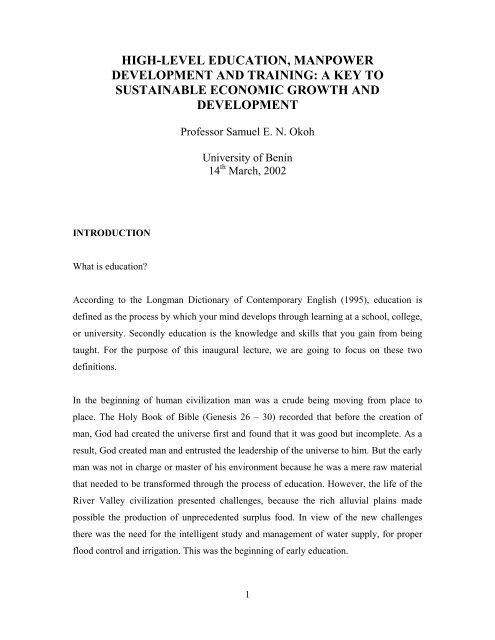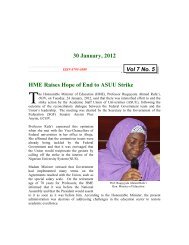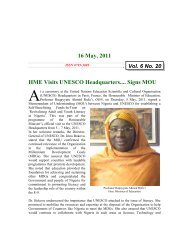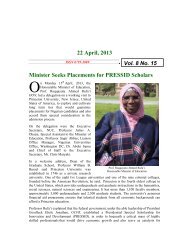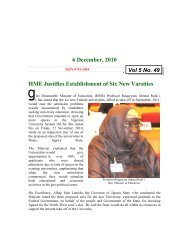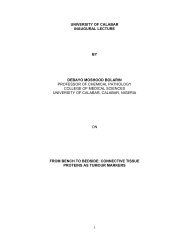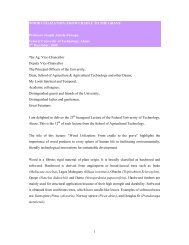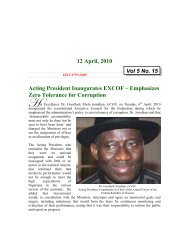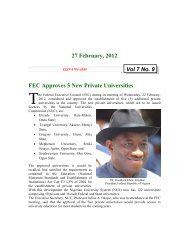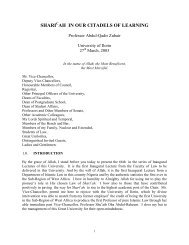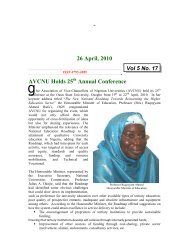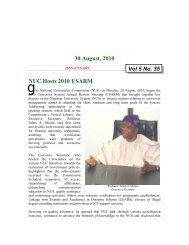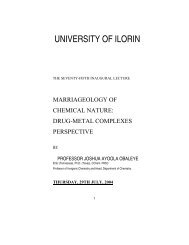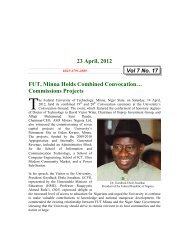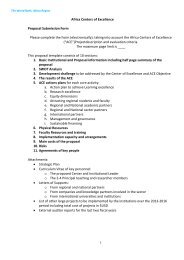high-level education, manpower development and training: a key to ...
high-level education, manpower development and training: a key to ...
high-level education, manpower development and training: a key to ...
- No tags were found...
You also want an ePaper? Increase the reach of your titles
YUMPU automatically turns print PDFs into web optimized ePapers that Google loves.
HIGH-LEVEL EDUCATION, MANPOWERDEVELOPMENT AND TRAINING: A KEY TOSUSTAINABLE ECONOMIC GROWTH ANDDEVELOPMENTProfessor Samuel E. N. OkohUniversity of Benin14 th March, 2002INTRODUCTIONWhat is <strong>education</strong>?According <strong>to</strong> the Longman Dictionary of Contemporary English (1995), <strong>education</strong> isdefined as the process by which your mind develops through learning at a school, college,or university. Secondly <strong>education</strong> is the knowledge <strong>and</strong> skills that you gain from beingtaught. For the purpose of this inaugural lecture, we are going <strong>to</strong> focus on these twodefinitions.In the beginning of human civilization man was a crude being moving from place <strong>to</strong>place. The Holy Book of Bible (Genesis 26 – 30) recorded that before the creation ofman, God had created the universe first <strong>and</strong> found that it was good but incomplete. As aresult, God created man <strong>and</strong> entrusted the leadership of the universe <strong>to</strong> him. But the earlyman was not in charge or master of his environment because he was a mere raw materialthat needed <strong>to</strong> be transformed through the process of <strong>education</strong>. However, the life of theRiver Valley civilization presented challenges, because the rich alluvial plains madepossible the production of unprecedented surplus food. In view of the new challengesthere was the need for the intelligent study <strong>and</strong> management of water supply, for properflood control <strong>and</strong> irrigation. This was the beginning of early <strong>education</strong>.1
The introduction of learning, particularly through written language, enhanced human<strong>development</strong>. This was very significant knowing that before this epoch making<strong>development</strong>, mankind had relied on the individual’s memory for human civilization. Theintroduction of writing protected knowledge from the decay <strong>and</strong> loss which it hadsuffered when knowledge was s<strong>to</strong>red only in the minds of men so that when such giftedmen died, the ancient civilization was lost: it was not only the death of the gifted personsbut the loss or records s<strong>to</strong>red in their memories. The knowledge kept in writing <strong>and</strong>transferred <strong>to</strong> a new generation through <strong>education</strong> brought about increased knowledge,which helped <strong>to</strong> increase production <strong>and</strong> improvement in the st<strong>and</strong>ard of living. It helped<strong>to</strong> reduce the dependence on the astrologers <strong>and</strong> magicians in explaining certain omens ofthe ancient world. In fact, the <strong>training</strong> of man helped <strong>to</strong> remove the mystical area ofknowledge. The final resultant impact of <strong>education</strong> is that it helped nations <strong>to</strong> attain theelusive state of economic <strong>development</strong>.Economic <strong>development</strong> has been defined by Okoh (1976) as a state of economicattainment of a society that allows the people <strong>to</strong> produce enough food, clothing <strong>and</strong> bettershelter. It means the elimination of yearly famine, which is commonly experienced by thedeveloping nations, <strong>and</strong> subjects them <strong>to</strong> starvation, poverty <strong>and</strong> death. It is a society ofliterate people with proper underst<strong>and</strong>ing of its environment devoid of superstition. It is aself sustaining economy. Economic <strong>development</strong> involves the proper utilization of anation’s resources <strong>to</strong> effectively increase productivity for the betterment <strong>and</strong> generalwelfare of the people. The achievement of a developed status involves the application ofmodern science <strong>and</strong> technology, which requires <strong>high</strong>-<strong>level</strong> <strong>manpower</strong> <strong>development</strong>,among others. To sustain the state of economic <strong>development</strong> requires new discoveries<strong>and</strong> most of the new discoveries cannot be achieved without effective research <strong>and</strong><strong>development</strong>, which calls for <strong>high</strong>-<strong>level</strong> <strong>manpower</strong> <strong>development</strong>.The human element in economic <strong>development</strong> is such that it must be <strong>high</strong>ly skilled. Itmust have the ability <strong>to</strong> search, discover, <strong>and</strong> mobilized the result for the <strong>development</strong> ofthe nation’s natural resources. Can anyone imagine the state of a nation without theinformation technology which had reduced the world <strong>to</strong> a global village?2
A nation that fails <strong>to</strong> recognize the importance of <strong>high</strong>-<strong>level</strong> <strong>manpower</strong> <strong>development</strong> <strong>and</strong><strong>training</strong> in nation building is doomed. Man’s potentials cannot be fully tapped without itsfull <strong>development</strong> in <strong>education</strong>. The Holy Bible book of Hosea 4:6 said that my peopleperish for lack of knowledge.Joseph Addison (1672 – 1719), quoted by Egbuchunam (2001) said, “<strong>education</strong> is acompanion which no misfortune can depress, no crime can destroy, no enemy canalienate, no despotism can enslave. At home a friend, abroad an introduction, in solitudea solace <strong>and</strong> in society an ornament. It hastens vice, it guides virtue, it gives at once grace<strong>and</strong> government <strong>to</strong> genius without it what is man? A splendid slave, a reasoning savage”To Ricardo (1817, in Bell 1967) labour is the architect of all produce that receives rents,profits, <strong>and</strong> wages, which in general helps <strong>to</strong> boost capital formation, therefore, labourmust be properly trained.In fact, the realization of the importance of <strong>high</strong>-<strong>level</strong> <strong>manpower</strong> <strong>development</strong> <strong>and</strong><strong>training</strong> <strong>to</strong> the national economies of Engl<strong>and</strong> <strong>and</strong> United States of America made theseeconomies <strong>to</strong> pay special attention <strong>to</strong> the early <strong>development</strong> of their <strong>education</strong>al sec<strong>to</strong>r intheir quest for sustainable economic <strong>development</strong>. There is urgent need for sustainedeconomic growth <strong>and</strong> <strong>development</strong> because many of the poor countries failed <strong>to</strong>participate in the global expansion of the 1990s, according <strong>to</strong> the World Bank 201Annual report. There is need <strong>to</strong> increase output in these countries <strong>and</strong> ensure that the gapbetween rich <strong>and</strong> poor does not widen.This inaugural lecture shows that <strong>high</strong>-<strong>level</strong> <strong>education</strong>, <strong>manpower</strong> <strong>development</strong> <strong>and</strong><strong>training</strong> are the <strong>key</strong>s <strong>to</strong> sustainable economic growth <strong>and</strong> <strong>development</strong>, in spite of thenation’s rising number of graduate unemployment. The nation should not be discouragedby the present state of widespread unemployment of <strong>high</strong>-<strong>level</strong> <strong>manpower</strong>.3
PERSPECTIVES ON HIGH-LEVEL MANPOWER DEVELOPMENTHigh-<strong>level</strong> Manpower according <strong>to</strong> the Ashby Report (1959) is defined as an <strong>education</strong>beyond the secondary school <strong>level</strong>. This definition classified not only the graduates ofuniversities, as <strong>high</strong>-<strong>level</strong> <strong>manpower</strong> but also, the graduates of other such institutions likepolytechnics <strong>and</strong> colleges of technology.Halsey (1961) sees the abundant <strong>and</strong> increasing supply of <strong>high</strong>ly educated people as theabsolute pre-requisite of social <strong>and</strong> economic <strong>development</strong> in our world. It is a conditionfor national survival because an individual is less than fully effective if his <strong>education</strong> <strong>and</strong><strong>training</strong> are less than the limit of his potential. Most of the uneducated are fast becomingan unproductive economic liability. The society must be an “educated society” <strong>to</strong>progress in <strong>to</strong>day’s world since investment <strong>and</strong> <strong>training</strong> on human resources contribute innumerous ways <strong>to</strong> the <strong>development</strong> of a general milieu favourable <strong>to</strong> economic progress.It provides complementary resources for comparatively scarce fac<strong>to</strong>r. Harbison (1964)agrees that although capital plays significant roles in economic growth <strong>and</strong> <strong>development</strong>,none is more important than human capital. When Alfred Marshal (1890) attributed thedifferences between the backward <strong>and</strong> civilized races <strong>to</strong> <strong>manpower</strong> <strong>development</strong>, he saidthat whereas the civilized races embraced the <strong>development</strong> of <strong>manpower</strong>, the backwardraces did not.The World Bank (1980) sees the <strong>development</strong> of people as encompassing <strong>education</strong> <strong>and</strong><strong>training</strong>, better health <strong>and</strong> nutrition, <strong>and</strong> fertility reduction. Manpower is the basicresource; it is an indispensable means of converting other resources <strong>to</strong> mankind’s use <strong>and</strong>benefit. How well we develop <strong>and</strong> employ human skill is fundamental in deciding howmuch we will accomplish as a nation. We live in a time when knowledge is exploding.There are more sources of knowledge <strong>and</strong> new techniques that are changing the world,<strong>and</strong> <strong>manpower</strong> must be well vested with the exp<strong>and</strong>ed knowledge <strong>and</strong> the newtechniques. Bolino (1968) observed that <strong>education</strong> is the only means <strong>to</strong> liberate man fromignorance <strong>and</strong> superstition <strong>and</strong> <strong>to</strong> help him master his environment. While Harbison(1963) said that the progress of a nation depends on the progress of its people, unless a4
nation develops the spirit <strong>and</strong> human potentialities, it cannot develop much materially,economically, politically, or culturally. The basic problem of most developing countriesis not the poverty of natural resources, but the under<strong>development</strong> of their humanresources, hence they must task themselves <strong>to</strong> build up their human capital. This entailsthe improvement of the nation’s <strong>education</strong> <strong>and</strong> <strong>training</strong> system.Heneman <strong>and</strong> Yoder (1967) see <strong>manpower</strong> <strong>development</strong> as not only an attempt <strong>to</strong> enrichthe quality of human knowledge through <strong>training</strong> but as the process of preparing man <strong>to</strong>undertake specific tasks <strong>and</strong> employment functions which help <strong>to</strong> transform theenvironment. Manpower <strong>development</strong> <strong>and</strong> <strong>training</strong> involve the <strong>development</strong> of skills <strong>and</strong>the <strong>to</strong>tal transformation of human resources. But this state of affairs cannot be attainedwithout an efficient <strong>and</strong> effective <strong>education</strong>al system since <strong>education</strong> <strong>and</strong> <strong>training</strong> are thebasic sources of transforming <strong>manpower</strong> which is the <strong>key</strong> <strong>to</strong> sustainable economic growth<strong>and</strong> <strong>development</strong>. Nations must, therefore, endeavour <strong>to</strong> develop their <strong>education</strong>al sec<strong>to</strong>r<strong>to</strong> ensure that the right type of <strong>training</strong> is given <strong>to</strong> people at the right places, <strong>and</strong> at theright time.MANPOWER DEVELOPMENT IN NIGERIAFafunwa (1969) said “if Nigeria is <strong>to</strong> move rapidly the 18 th century in<strong>to</strong> the 20 th century,she must place <strong>education</strong> in<strong>to</strong> the main stream of economic, social <strong>and</strong> cultural<strong>development</strong>, otherwise no major industrial revolution can neither take place or besustained, nor can a new society be built or maintained”. He said that “any country wherethe masses are still held down largely by ignorance, disease <strong>and</strong> poverty could notsurvive”.Harbison (1973) <strong>and</strong> Yesufu (1962) have both observed that human resources constitutethe ultimate wealth of a nation, while Myrdal (1969) <strong>and</strong> Okoh (1984), attributed one ofthe causes of the poverty of nations <strong>to</strong> lack of <strong>education</strong>. In fact, Lewis (1966) Heilbrun(1974) <strong>and</strong> Okoh (1984), have identified human capital <strong>development</strong> as one of the majordeterminants of income distribution because individuals with little <strong>education</strong> <strong>and</strong> <strong>training</strong>5
have low marginal productivities <strong>and</strong> earn low income. Low <strong>level</strong>s of income <strong>and</strong>productivity would affect the aggregate dem<strong>and</strong> that would result <strong>to</strong> low <strong>level</strong>s ofeconomic growth <strong>and</strong> <strong>development</strong>. Improvement in income <strong>and</strong> productivity wouldbring about improvement in human welfare.The formalized form of the <strong>development</strong> of human capital calls for the provision of<strong>education</strong>al facilities like school buildings furniture, equipment chemicals, books,teachers <strong>and</strong> all the other teaching aids needed <strong>to</strong> make the <strong>education</strong> <strong>and</strong> <strong>training</strong> ofpeople a success.THE COLONIAL ADMINISTRATION AND NIGERIAN HIGH-LEVELMANPOWER DEVELOPMENTOkoh (1969) <strong>and</strong> (1976) observed that the British colonial masters unders<strong>to</strong>od the effects<strong>and</strong> the importance of <strong>high</strong>-<strong>level</strong> <strong>manpower</strong> <strong>development</strong>, but left the <strong>education</strong> ofNigerians <strong>to</strong> the Christian missionary societies. According <strong>to</strong> Coleman (1958) the schoolwas the church right away in the bush, <strong>and</strong> the teacher was the village evangelist. Until1945, the mission schools dominated 99 percent of schools, which were mostly located inSouthern Nigeria. The British colonial administration paid lip service <strong>to</strong> the support ofthe <strong>education</strong> of Nigerians, but decided <strong>to</strong> do something when they discovered thatwithout western <strong>education</strong> given <strong>to</strong> Nigerians, there would be no clerks <strong>and</strong> technicians <strong>to</strong>fill the roles in administration <strong>and</strong> commerce, which were unprofitable or impossible <strong>to</strong>fill by the Europeans. Crowder (1968) noted that not until 1931 with the appointment ofGovernor Sir Donald Cameron did the colonial government become more concernedabout the <strong>education</strong> of Africans. The new awareness was as a result of the governmentpolicy of employing more Africans in its service. The founding of Yaba College wasconceived during this period. The governor discovered that due <strong>to</strong> the intemperateclimate. Europeans were known for absenteeism <strong>and</strong> were expensive <strong>to</strong> employ <strong>and</strong> as aresult, it became imperative for the position of clerks <strong>and</strong> other lower caliber staff <strong>to</strong> belocally trained <strong>and</strong> employed.6
The curriculum of the local institutions meant <strong>to</strong> train local staff was of the mediocretype. Mbadiwe (1944), in his criticism of local institutions, observed that it was notuncommon <strong>to</strong> find an educated Nigerian who could name the principal English cities,quote the Bible <strong>and</strong> recite Hamlet, but who has little knowledge of geography, or theproverbs <strong>and</strong> folk tales, or names of the prominent leaders <strong>and</strong> outst<strong>and</strong>ing events in thehis<strong>to</strong>ry of Nigeria.In spite of the early mediocre nature of the colonial <strong>education</strong> of Nigerians, it contributedimmensely <strong>to</strong> the country’s economic growth <strong>and</strong> <strong>development</strong>. The effects of British<strong>training</strong> were seen on the Nigerian Independence Day in 1960. On that day according <strong>to</strong>Newsweek (1966), Nigeria became the first African’s nation <strong>to</strong> count on African besttrained<strong>and</strong> biggest civil service. The British had trained 845 Nigerian medical doc<strong>to</strong>rs,over 1000 lawyers, 37,000 civil servants, <strong>and</strong> 61 S<strong>and</strong> Hurst trained army officers. Incontrast, the Congo reached independence without a single black doc<strong>to</strong>r, lawyer,engineer, <strong>and</strong> army officer or senior civil servant. In fact, by 1960, more than 20,000Nigerians had attended British universities <strong>and</strong> 5,000 more Nigerians were in Britain atthat date, while Nigerian schools were well established. This shows that Nigeria had forlong known the importance of <strong>high</strong>-<strong>level</strong> <strong>education</strong> <strong>to</strong> national <strong>development</strong>. Thisstatement was confirmed by Yesufu (1996) who said that before 1960 everyone agreedon the need for <strong>and</strong> value of <strong>education</strong> but it appears there was inadequate perception <strong>and</strong>objectives.In spite of this achievement, the Third National Development Plan observed that quiteoften the <strong>development</strong> of most developing countries have been held back by a trinity ofconstraints, savings, foreign exchange, <strong>and</strong> executive capacity. In the case of Nigeria,these projections make it quite clear that there will be no savings or foreign exchangeconstraints during the Third Plan period. However, the lack of sufficient <strong>high</strong>-<strong>level</strong><strong>manpower</strong> or executive capacity remains a bottleneck <strong>to</strong> the <strong>development</strong> of the nation.THE 1959 ASHBY COMMISSION7
To resolve the problem of the shortage of <strong>high</strong>-<strong>level</strong> <strong>manpower</strong>, the government<strong>development</strong> policies of the past have stressed increasing the nation’s s<strong>to</strong>ck of trained<strong>manpower</strong> through the expansion of <strong>education</strong>al facilities. This policy led <strong>to</strong> theestablishment of the Ashby Commission 1959.The Commission was established by the federal government <strong>to</strong> assess the state of thenation’s <strong>high</strong>-<strong>level</strong> <strong>manpower</strong> <strong>development</strong> <strong>and</strong> recommend ways forward. The work ofthe commission led <strong>to</strong> the establishment of the National Manpower Board, which wasvested with the authority <strong>to</strong> forecast how the nation’s <strong>manpower</strong> needs could be met. Toaccelerate the <strong>training</strong> of <strong>high</strong> <strong>level</strong> <strong>manpower</strong>, the commission also recommended theexpansion <strong>and</strong> establishment of more universities. The effect of the Ashby Commissionwas the rapid growth in the <strong>development</strong> <strong>and</strong> expansion of <strong>high</strong> <strong>level</strong> institutions oflearning in the country as shown in Table I. The number of the Nigerian universitiesincreased from one university in 1948 that graduated 35 students in 1953 <strong>to</strong> twenty-eightuniversities graduating 21,717 persons in 1982/83. Al<strong>to</strong>gether, the number of universitieshas increased <strong>to</strong> 33 as of 1997 according <strong>to</strong> NUC 1997 Statistical informationTABLE INUMBER OF UNIVERSITIES IN NIGERIA BETWEEN 1948 1983Year of Establishment Total Cumulative1948 1 1 11960 1 1 21962 3 3 51970 1 1 61975 7 7 131980 6 6 191981 4 4 231983 5 5 288
Source: Extracted from Afolabi Toye, “Proliferation of Universities”. The Nigerian Experience, IlorinJournal of Education Vol. 4, No. 4, 1984Mr. Vice-Chancellor Sir, Ladies <strong>and</strong> Gentlemen, you may be glad <strong>to</strong> know that the firstExecutive Secretary <strong>to</strong> the National Manpower Board in 1962 was Prof. T. M. Yesufuwith my humble self as one of his secretarial staff. This explains the father-sonrelationship between Prof. T.M Yesufu <strong>and</strong> myself. We thank God that we still have menof Prof. T. M. Yesufu’ caliber around.THE EFFECT OF UNIVERSITY EXPANSIONOkoh (1986) conducted a study showing that the expansion of universities has turned thecountry’s <strong>high</strong>-<strong>level</strong> <strong>manpower</strong> shortage, which was prominent in the 1960s <strong>to</strong> <strong>high</strong>-<strong>level</strong><strong>manpower</strong> surplus. The result of the study showed the under-utilization <strong>and</strong>underemployment of <strong>high</strong>-<strong>level</strong> <strong>manpower</strong> in Nigeria.The graduate unemployment of the 1980s is a very significant phenomenon given that inthe 1970s that over 80 percent of university graduates who completed the National Youthservice got jobs within three months of completion, according <strong>to</strong> the 1984 NYSCGraduate Employment Tracer Study sponsored by the Direc<strong>to</strong>rate, <strong>and</strong> the NationalManpower Board. The Tracer’s study showed that about 93 per cent of the 1983graduates who completed the National Youth Service remained unemployed at the end oftheir Scheme in June 1984. This trend had even worsened since then because while theNigerian <strong>education</strong> has borne the burden of rising population, arising from the increaseddem<strong>and</strong> for <strong>education</strong>, the economy has witnessed a decrease in per capita nationalincome <strong>and</strong> productivity resulting in unemployment <strong>and</strong> underemployment. The growinggraduate unemployment is causing concern because professions like engineering,medicine, architecture etc, are now involved in the unemployment crisis. Although, whileserious concern is being raised over the state of the country’s graduate unemployment<strong>and</strong> underemployment, no parent has volunteered <strong>to</strong> keep his/her child off the universitygate, pending the time when the university graduates could be assured employmen<strong>to</strong>pportunities.9
Why should medical doc<strong>to</strong>rs, engineers, architects, <strong>and</strong> so on be unemployed in adeveloping country like Nigeria? Okoh (1987) conducted a study on graduateunemployed in Nigeria. In the study, we looked at the impact of graduate turn-out againstthe occupational vacancy rates, the relationship of the nation’s economic growth <strong>to</strong> theemployment opportunities, the problem of ethnicity, statism, religion, contractemployment, etc.Table II shows that the <strong>to</strong>tal undergraduate enrolments in the Nigerian Universities in the1972/73 academic session jumped from 20,899 students <strong>to</strong> 94,375 student in the 1982/83academic session. Although the enrolment has since increased <strong>to</strong> 213,517 in 1994/95academic session, while the nation’s university graduates according <strong>to</strong> the NationalUniversities Commission increased from 2,473 in 1971 <strong>to</strong> about 20,000 in the 1983/84.We found that the astronomical increase in graduate output was not matched by theemployment opportunities. However, there has been an argument amongst HumanResources experts whether <strong>high</strong>-<strong>level</strong> <strong>training</strong> has <strong>to</strong> be dependent on the nation’s ability<strong>to</strong> create job opportunities. There was also the problem of statism, where stategovernments <strong>and</strong> other employers of labour preferred applicants of their states of origin.Yesufu (2001) puts it this way, “Statism compounded the inability of Nigerians <strong>to</strong> movefreely in pursuance of legitimate business <strong>and</strong> other productive employment in their owncountry”.10
TABLE IINIGERIAN UNIVERSITIES – TOTAL ENROLMENTS 1972/73 – 1994/95YEARTOTAL1972/73 20,8991973/74 23,2281974/75 26,4481975/76 32,2861976/77 41,4991977/78 47,6701978/79 49,9031979/80 57,5421980/81 70,2521981/82 82,9521982/83 94,3751983/84 -1984/85 -1985/86 128,1011986/87 143,9511987/88 151,4121988/89 159,3981989/90 162,7111990/91 179,2311991/92 171,3871992/93 193,3951993/941994/95 213,517Source: National Universities Commission Annual Report, July – Dec., 19821993 NUC Annual Report1997 NUC Statistical Information on Universities.11
Other fac<strong>to</strong>rs found responsible for the graduate unemployment, include lack of effectiveeconomic growth in the Nigerian economy. The nation’s industrial base was notdeveloping fast enough <strong>to</strong> absorb the army of the unemployed graduates. The study alsofound that Nigerian graduates lacked entrepreneurial ability, thereby lacking ininnovation. The Nigerian <strong>education</strong> has been elitist because it was merely designed forthe pursuit of certificates without much emphasis given <strong>to</strong> vocational or entrepreneurialability. The result was that most Nigerian graduates were oriented <strong>to</strong>wards salary jobs.We thank God that the Vice-Chancellor, Prof. R.A. Anao, has introduced a course inentrepreneurship at the University of Benin. There was also imbalance betweenArts/Humanities <strong>and</strong> Physical sciences as shown in Table III. The rural urban problemwas identified while the issue of poor <strong>training</strong> arising out of poor funding was equallynoted.TABLE IIITHE NIGERIAN UNIVERSITY GRADUATE OUTPUT BY FACULTY FORSELECTED YEARSFacultiesYears1971 1975 1982/83 1983/84Administration 157 217 1,862 1,720Education 174 586 5,754 5,026Law 130 162 1,002 1,026Social Sciences 406 640 3,208 2,935Health Profession 176 448 1,719 1,420Engineering <strong>and</strong> Technology 224 387 1,530 1,282Natural Sciences 448 585 2,236 1,947Agricultural Studies 128 326 805 727Total 2,473 3,878 21,717 19,71712
Sources: 1980 FOS Annual abstract of Statistics, National Universities Commission Annual ReportEDUCATIONAL FUNDING IN GENERALEducational funding is a controversial issue in many countries. The Economist of London(Oc<strong>to</strong>ber 6 th 2001) observed that since the British expansion of the university <strong>education</strong>in the 1980s the number of students has doubled, but the government funding has barelyincreased. It said, “The amount of money the universities receive for each student hasfallen sharply. For example, in 1990, the British Universities were receiving about eightthous<strong>and</strong> pounds per student but this amount had been reduced <strong>to</strong> about five thous<strong>and</strong>s in2001”The Vice-Chancellors of the British universities are very concerned because lowfounding is affecting the quality of <strong>education</strong>. The Vice-Chancellor of LondonUniversity, Professor Zellick, said that the funding situation is making many universities<strong>to</strong> run useless degree programmes for unqualified students just <strong>to</strong> earn extra income. Thistends <strong>to</strong> remind us here in Nigeria of the various ill-equipped off-campus programmesthat have been closed down by the federal government.Education is a very costly venture. As the saying goes, those who complain of the <strong>high</strong>cost of <strong>education</strong> should try ignorance. The rising cost of <strong>education</strong> is a worldwidephenomenon, although it tends <strong>to</strong> be more acute in a developing country like Nigeria.But, in spite of its <strong>high</strong> cost, it must be recognized that <strong>education</strong> plays such a vital role ina society that it must not be compromised. For example, Alfred Marshall (1890), in Okoh(1984), stressing on the importance of human <strong>development</strong> wrote.that the wisdom of expending public <strong>and</strong> private funds on <strong>education</strong> is not<strong>to</strong> be measured by its direct fruits alone. It would be profitable as mereinvestment <strong>to</strong> give the masses of the people much greater opportunitiesthan they can generally avail themselves of. For by this means many, who13
would have died unknown, are enabled <strong>to</strong> get the start needed forbringing about their latent abilities. An economic value of one greatindustrial genius is sufficient <strong>to</strong> cover the expenses of the <strong>education</strong> of awhole <strong>to</strong>wn; for one new idea, such as Bessemer’s chief invention adds asmuch <strong>to</strong> Engl<strong>and</strong>’s productive power as the labour of a hundred thous<strong>and</strong>men less direct, but not less in importance is the aid given <strong>to</strong> productionby medical discoveries such as those of Jenner or Pasteur, whichincreased our health <strong>and</strong> working power, <strong>and</strong> again by scientific worksuch as that of mathematics or biology even though many generationsmay pass away before it bears visible fruits in greater material well being.All that is spent during many years in opening the means of <strong>education</strong> <strong>to</strong>the masses would be well paid for if it produces one New<strong>to</strong>n or Darwin.Shakespare or Beethoven.In fact, Okoh (1980, 1984, 1985, 1987, 1989, 1990, 1992, 1996, 1998, 2000 etc.) hadshown in these various studies the impact of <strong>high</strong>-<strong>level</strong> <strong>education</strong> ranging fromimproving unfair trade practices, increasing agricultural production, poverty alleviation,reduction of income inequality, reduction of population growth, reduction of ethnicity,creation of awareness on the Structural Adjustment Programme (SAP) management offoreign debt, <strong>to</strong> the enhancement of privatization awareness, political stability, <strong>and</strong>underst<strong>and</strong>ing the danger of foreign importation. In fact, <strong>education</strong> has been described asan electric current, which must flow without interruption.EDUCATIONAL FUNDING IN NIGERIAIn a study we conducted on <strong>education</strong>al funding in Nigeria, (Okoh 1989), we were able <strong>to</strong>establish that the <strong>education</strong>al funding up <strong>to</strong> the 1970s had always been a mixed grill,involving the government <strong>and</strong> the private sec<strong>to</strong>r. The private sec<strong>to</strong>r was made up ofparents, individuals, missionaries, business organizations <strong>and</strong> international non-profi<strong>to</strong>rganizations. The schools, according <strong>to</strong> UNESCO (1966), were self-supporting. Theusers of <strong>education</strong>al facilities were taxed heavily in the form of school fees by their14
various institutions, although scholarships were given <strong>to</strong> the most brilliant students. Therevenue generated from schools fees <strong>and</strong> other charges by the various <strong>education</strong>alinstitutions helped <strong>to</strong> maintain <strong>and</strong> provide further services. During this period <strong>education</strong>was on one h<strong>and</strong> elitist <strong>and</strong> on the other missionary related because only the children ofthe well <strong>to</strong> do could go <strong>to</strong> schools. But as the nation realizes the <strong>key</strong> role of <strong>education</strong> innation building, <strong>and</strong>, with enhancement in financial resources, government <strong>to</strong>ok a greaterinterest in the financing <strong>and</strong> administration of <strong>education</strong>al institutions. For example, fromthe 1970s the Nigerian government started <strong>to</strong> bear the lion’s share of <strong>education</strong>al funding.This was made possible by the nation’s oil boom. In the Third National DevelopmentPlan (1975 – 80), for example the <strong>education</strong>al sec<strong>to</strong>r accounted for about N3.2 billion or12 per cent of the <strong>to</strong>tal public effective expenditure programme of N26.5 billion. Incomparison <strong>to</strong> what used <strong>to</strong> prevail before this period, it was a significant allocation. Thisis because the 1970 – 74 Development Plan, allocated only N98 million or 5 per cent of<strong>to</strong>tal public expenditure <strong>to</strong> <strong>education</strong>, although the increased federal government’sfunding could be explained from the increased enrolment as shown in Table IV. Thestudy observed that within a very short period of time, Nigeria witnessed anunprecedented increase in enrolment in all classes of institutions.TABLE IV1975/1976- 1980 PRIMARY – UNIVERSITY SCHOOL ENROLMENTTYPES OF SCHOOLS 1975 – 76ENROLMENT1980ENROLMENTPrimary School 5,950,296 12,749,403Secondary 704,912 2,226,124Polytechnic/College of Technology 11,993 35,577Universities 31,511 57,772Source: fourth National Development Plan15
The <strong>education</strong>al industry has become so gigantic that it is no longer possible for itsfunding <strong>to</strong> be left <strong>to</strong> one sec<strong>to</strong>r alone.The reason for the rapid rise in <strong>education</strong>al enrolment in all <strong>level</strong>s of <strong>education</strong>alinstitutions was the introduction of the Universal Free Primary Education Policy (UPE) in1976, the first known national policy on <strong>education</strong>.Also, compounding the surge was the free <strong>education</strong> at all <strong>level</strong>s, introduced by some ofthe state governments of the federation. The massive increase in enrolment was seen as agood omen for human resources <strong>development</strong>. However, it created other problems likeshortages of classrooms, teaching staff, teaching aids, <strong>and</strong> serious financial constraints. Infact, <strong>education</strong>al funding was made more difficult given the uncontrolled nature ofenrolment at a period of decreasing revenue. In view of the huge expenditure involved inproviding <strong>education</strong>al facilities, <strong>and</strong> <strong>education</strong> being both public <strong>and</strong> private good, therehave been debates amongst the experts as <strong>to</strong> how <strong>to</strong> fund <strong>education</strong>. Some experts areadvocating that the receivers of <strong>education</strong>al <strong>training</strong> must be responsible for the paymen<strong>to</strong>f their <strong>training</strong>, while others argued that the government should bear the entire cost of<strong>education</strong>. For example Aris<strong>to</strong>tle (384 – 322 BC) in Bell (1967) advocated for the stateresponsibility of <strong>education</strong> because by so doing, it would make it easier <strong>to</strong> produce thefinest in human nature.Given the role <strong>education</strong> plays, the 1989 study on <strong>education</strong>al funding recommended thata clear-cut national policy on <strong>education</strong>al funding be advocated. This is important, giventhe government posture, which had left the universities in a financial mess, because thegovernment neither gives them enough money, nor allows them the freedom <strong>to</strong> increasefees.The government is, instead, asking the universities <strong>to</strong> cut costs <strong>and</strong>, also <strong>to</strong> look foralternative sources of revenue because this is no longer the period of squ<strong>and</strong>ermania thatcharacterized the country between the 1970s <strong>and</strong> 1980s arising from the oil boom.16
The oil boom created an era of misguided illusion that money was not our problem,according <strong>to</strong> the 1981 Budget analysis.This illusion led <strong>to</strong> project costs being unnecessarily inflated. The projects were said <strong>to</strong>have been designed not primarily <strong>to</strong> suit designers. Table V appears <strong>to</strong> support the liberalfunding of <strong>education</strong> during this period.TABLE V1976 – 1985 FEDERAL GOVERNMENT BUDGETS ALLOCATIONS TOEDUCATIONYEAR Nation’s Budget Allocation <strong>to</strong> % of Total BudgetN Billion Education*N millions1976 – 77 10.7 1,329 121977 –78 8.6 779 91978 – 79 8.0 1,112 141979 –80 9.5 750 81980 11.9 1,196 101981 12.8 1,383 111982 10.9 1,201 111983 12.8 1,140 91984 10.1 875 91985 11.3 876.5 8Total N85.2 N8,890.5 10* It includes allocations <strong>to</strong> sciences <strong>and</strong> TechnologySources: Recurrent <strong>and</strong> Capital Estimates of the Government of the Federal Republic of Nigeria.17
The table represents a ten year recurrent <strong>and</strong> capital estimate on the <strong>education</strong>al sec<strong>to</strong>rfrom the period of the introduction of the Universal Primary Education (UPE) in 1976 <strong>to</strong>1985. The study used the table <strong>to</strong> assess the degree of federal government funding of<strong>education</strong>. We used the federal government estimates as a yardstick on <strong>education</strong>alexpenditure because the Federal Ministry of Education has a dominant share in the fieldof <strong>high</strong>er <strong>education</strong> but lesser responsibility for primary <strong>education</strong> <strong>and</strong> secondary<strong>education</strong>. The Table shows that between 1976 <strong>and</strong> 1985 fiscal years, out of a <strong>to</strong>talBudget of N85 billion, about N9 billion or 10 per cent was allocated <strong>to</strong> the <strong>education</strong>alsec<strong>to</strong>r. This was a very significant allocation although smaller when compared with the12 per cent earlier allocated between 1975 <strong>and</strong> 1980. However, <strong>education</strong> is on theconcurrent legislative list, meaning that the federal, state <strong>and</strong> local governments canprovide <strong>education</strong>. But, if compared with the present 26% UNESCO recommendation<strong>and</strong> 30% recommended by the Presidential Committee on Future Higher Education, the12% <strong>and</strong> 10% appear very low, respectively. For example, in 1985 the estimate on<strong>education</strong> of the former Western states, including Bendel, amounted <strong>to</strong> over 40 per cen<strong>to</strong>f their <strong>to</strong>tal budgets, while most of the remaining states of the federation budgets rangebetween 20 per cent <strong>and</strong> 34 per cent.The study also discovered that the Nigerian <strong>education</strong>al <strong>development</strong> has risen so fast <strong>to</strong> a<strong>level</strong> that she was finding it difficult <strong>to</strong> sustain, because various state governments wereestablishing universities purely on political grounds rather than on well-articulated needs.Also, most of the state governments were advocating free <strong>education</strong> at all <strong>level</strong>s. Thesegovernments had no courage <strong>to</strong> tell the youths that they could not sustain free <strong>education</strong>at the university <strong>level</strong> <strong>and</strong> at the same time maintain facilities. There is hardly any freemeal anywhere in the world because anything that has an economic value must haveassociated cost.18
TABLE VI1986 – 1995 FEDERAL GOVERNMENT ANNUAL BUDGE ALLOCATION TOEDUCATIONYEAR Overall Nation’sBudgetEducationalBudgetN Billions% Of EducationalBudget <strong>to</strong> OverallBudgets1986 15.6 0.65 41987 17.9 0.34 21988 24.4 0.53 21989 30.1 1.29 41990 39.8 1.46 41991 38.7 0.76 21992 27.6 2.40 91993 112.1 8.00 71994 110.2 7.7 71995 98.2 12.7 13Total 475.9 35.83 7Source: Extracted from various Ministerial Budget speeches between 1986 – 1995 <strong>and</strong> as published bydaily sketch, January 2, 1986, Nigerian Observer January 1, 1988, Sunday Times, January 15, 1989, Dailysketch, January 8, 1990, Daily times January 1, 1991, Daily Times January 1, 1992, CBN StatisticalBulletin (vol. 4 No. 2, Dec. 1993), The Guardian, January 11, 1994, Daily Times January 17, 1995.But when we compared 1976/77 – 1985 period with another ten year period, 1986 <strong>to</strong>1953 since our earlier study terminated in 1985, we discovered that the yearly averageallocation <strong>to</strong> the <strong>education</strong>al sec<strong>to</strong>r had even declined <strong>to</strong> about 7 per cent as shown inTable VI. This tends <strong>to</strong> confirm the UNESCO (1962) Karachi Plan, which had observedthat many low-income countries would be unable <strong>to</strong> give universal free <strong>education</strong> at all<strong>level</strong>s owing <strong>to</strong> the unrestricted population upsurge in those countries. The inability of the19
federal government <strong>to</strong> effectively sustain <strong>education</strong>al funding demonstrates lack ofadequate government planning. The nation has failed in planning the number of peoplelikely <strong>to</strong> be educated yearly, facilities <strong>to</strong> be needed, <strong>and</strong> above all the cost involved. Thefailure arose from the inadequate <strong>and</strong> unreliable data emanating from the country’sinability <strong>to</strong> conduct the national population census, <strong>and</strong> the lack of a labour marketsurvey. In fact, planning must not only project cost, it must also project the likelynumbers of trained <strong>manpower</strong> annually.RECOMMENDATIONS/CONCLUSIONIt has been the wish of our political leaders <strong>to</strong> raise the living st<strong>and</strong>ards of our peoples,<strong>and</strong> this has always meant industrialization at all costs. They seem <strong>to</strong> forget that in order<strong>to</strong> make any progress <strong>to</strong>wards the raising of the st<strong>and</strong>ard of living, it is necessary that wedevelop our human <strong>and</strong> natural resources for the effective production of goods <strong>and</strong>services.The <strong>development</strong> of our natural resources depends upon the availability of many fac<strong>to</strong>rs,the most important of which is <strong>high</strong>-<strong>level</strong> <strong>manpower</strong>. We may not have all the requiredcapital for the nation’s <strong>development</strong> but we have the required human resources that need<strong>to</strong> be trained because it is the <strong>key</strong> <strong>to</strong> sustainable economic growth <strong>and</strong> <strong>development</strong>.Having the best educated labour force that operates the machine manufacture by man,therefore, labour must be educated labour force <strong>to</strong> manufacture <strong>and</strong> operate the computeretc.In this inaugural lecture, we have observed the role of <strong>high</strong>-<strong>level</strong> <strong>education</strong> as the engineof the sustainable economic growth <strong>and</strong> <strong>development</strong> of a nation. The <strong>development</strong> of amodern state depends upon the <strong>development</strong> of people. In fact, <strong>high</strong>-<strong>level</strong> <strong>manpower</strong><strong>development</strong> is a sine qua non for sustainable economic growth <strong>and</strong> <strong>development</strong> inNigeria. But what about the problem of graduate unemployment?20
From the analysis we presented in this lecture, we have observed that the rapid turnout of<strong>high</strong>-<strong>level</strong> <strong>manpower</strong> had indeed resulted <strong>to</strong> graduate unemployment. The graduateunemployment problem arose in part as a result of the slow pace in closing up vacancyrates by the employers of labour, inadequate <strong>manpower</strong> planning, immobility of labourarising from state-of –origin syndrome <strong>and</strong> ethnicity, population growth etc. The lack ofaccurate <strong>and</strong> up-<strong>to</strong>-date data on labour markets has hindered the determination of theactual number of graduates in the labour force, <strong>and</strong> its composition. One of the urgentmeasures <strong>to</strong> resolve the present crisis is <strong>to</strong> conduct an accurate national population censusbecause the present under utilization of <strong>high</strong>-<strong>level</strong> <strong>manpower</strong> was partly due <strong>to</strong> inaccuratedata used in planning. There was also the lack of an effective information system thatwould guide qualified people on carrier prospects <strong>and</strong> job opportunities.The nation cannot bridge the gap between <strong>manpower</strong> <strong>development</strong> <strong>and</strong> utilization withouteffective <strong>manpower</strong> planning, <strong>and</strong> until such is done redundancies in <strong>high</strong>-<strong>level</strong><strong>manpower</strong> usage will continue <strong>to</strong> occur. Also intensifying the graduate unemploymentproblem is the issue <strong>to</strong> employers of labour preferring c<strong>and</strong>idates from their own states oforigin, or from their ethnic groups. This has hindered effective <strong>manpower</strong> utilization.Some states even carry this policy <strong>to</strong> a ridiculous <strong>level</strong> by preferring the employment ofexpatriates <strong>to</strong> Nigerians from other states. The government must enact a law prohibitingsuch practices. Okoh (1986) observed that the rigidity of the nation’s salary structure,which tends <strong>to</strong> place c<strong>and</strong>idates with degrees on <strong>high</strong> wages irrespective of the jobevaluation, prevented employers of labour from using labor-intensive method ofproduction <strong>to</strong> capital intensive techniques. There is need for a flexible wage structurebecause there are employees who would prefer <strong>to</strong> accept less than minimum wage <strong>to</strong>unemployment. Industries should be free <strong>to</strong> negotiate wages upwards or downwards,depending upon the economic situation of the country. Salaries or wages should not bebased on academic degrees but on job evaluation. For example, it is not unusual <strong>to</strong> find aPh.D. degree holder teaching in a secondary school in developed countries of Europe <strong>and</strong>America whose pay is commensurate with the job done.21
The nation’s primary <strong>and</strong> secondary schools are presently poorly staffed, <strong>and</strong>unemployed university graduates could be deployed <strong>to</strong> these institutions. These schoolsmust be made <strong>to</strong> employ university graduates who are walking the streets unemployed<strong>and</strong> paid accordingly. There is need for a deliberate government policy <strong>to</strong> ensure thatNigerian industries employ a labour intensive system of production instead of one that iscapital intensive.Also, since most of the Nigerian businesses e.g. banking, manufacturing, petroleum, etc,are making windfall profits, they should be made <strong>to</strong> employ a given number of universitygraduates yearly. In fact, most of the Nigerian establishments can afford <strong>to</strong> introduce shiftsystems instead of their employees working from 8 a.m. <strong>to</strong> 12 mid-night. The governmentmust enact a law <strong>to</strong> s<strong>to</strong>p this type of slave labour.There is need for an effective <strong>and</strong> consistent economic policy geared <strong>to</strong>wards enhancingthe nation’s economic growth <strong>and</strong> <strong>development</strong> because rising economic growth wouldbring about increased employment opportunities. While inconsistent <strong>and</strong> regular policyrevisal would result <strong>to</strong> capital flight. In fact, foreign inves<strong>to</strong>rs would not be attracted in<strong>to</strong>an environment with socio-economic instabilities. Government economic policy shouldbe an instrument of income redistribution, stimulating economic growth, promoting fullemployment, compacting inflation <strong>and</strong> maintaining economic stability.Government should review the present practice where officials retire at a very young agebut only <strong>to</strong> take contract appointments with other government departments. This systemdoes not encourage the employment of university graduates. Contract employment shouldbe on the basis of need. To effectively plan <strong>and</strong> mobilize unemployed universitygraduates, government must create Unemployment direc<strong>to</strong>rate at various stategovernment <strong>level</strong>s where every unemployed graduate must register. The Direc<strong>to</strong>rate mustbe given adequate publicity <strong>to</strong> ensure an effective information system. The Direc<strong>to</strong>ratemust be responsible for registering, counseling <strong>and</strong> deploying the unemployed graduates.Government must ensure that every new employment is advertised through theDirec<strong>to</strong>rate. The Direc<strong>to</strong>rate must be empowered <strong>to</strong> guarantee soft loans for business-22
oriented unemployed graduates wishing <strong>to</strong> embark on small-scale industries. TheNigerian university graduates on their part, must be more creative <strong>to</strong> eliminate thedependency syndromeIn spite of all the recommendations that we have suggested in this lecture, we would like<strong>to</strong> call for the urgent restructuring of the Nigerian economy. The present trend where thenation is overly dependant on crude oil should be critically reviewed. The economy mustbe inward looking by adopting integrated rural <strong>development</strong>, which would enhanceincome, employment, agricultural <strong>development</strong> <strong>and</strong> productivity. This method wouldhelp <strong>to</strong> fight poverty <strong>and</strong> inequality. In fact, the war against poverty cannot be wonwithout an acceptable investment on <strong>education</strong>. it would improve the general st<strong>and</strong>ard ofliving <strong>and</strong> bring about economic growth <strong>and</strong> <strong>development</strong>. For example, Killick (1981)recommended solving the problem of unemployment through a system called“redistribution through growth”. The system solves the problem of poverty,unemployment <strong>and</strong> inequality. He therefore believes that the concept of redistributionthrough growth would be more comprehensive. This system he said, tends <strong>to</strong> tacklepoverty, inequality <strong>and</strong> unemployment by accelerating the growth of the economy in suchways which ensure that increments <strong>to</strong> assets <strong>and</strong> output are more equitably distributedespecially <strong>to</strong> those living in poverty. We would also like <strong>to</strong> suggest employment creationthrough appropriate economic policies like public workers, <strong>and</strong> tax incentives <strong>to</strong>employers who may be willing <strong>to</strong> establish industries outside the urban areas.On <strong>education</strong>al funding, we will like <strong>to</strong> restate our earlier recommendation <strong>to</strong> the formerVice-Chancellor Professor Grace Alele Williams who wrote us on February 13 th 1991, <strong>to</strong>help prepare Uniben’s position paper on “Higher Educational funding” for presentationbefore the Longe Commission. One of the two articles presented was the article onEducational Funding <strong>and</strong> Human Resource <strong>development</strong> in Nigeria, <strong>and</strong> one of our majorrecommendations, which has since been adopted, was the introduction of <strong>education</strong>alprofit tax amongst big business organizations. We were indeed very happy that thisrecommendation was adopted. We hope that all the companies who are <strong>to</strong>day declaring23
windfall profit in Nigeria in spite of low capacity utilization are also paying windfall<strong>education</strong>al profit tax.Educational Funding cannot be complete without parents <strong>and</strong> guardians paying for a par<strong>to</strong>f the sustenance of their wards in <strong>high</strong>er institutions. There is no free meal in economicsbecause anything that has value has an associated cost. Parents <strong>and</strong> guardians must besensitive enough <strong>to</strong> make economic contributions <strong>to</strong>wards the <strong>training</strong> of their wards.On the part of the federal government, scholarships should be given <strong>to</strong> all students whomaintain a grade point average of 3.0 <strong>and</strong> above. While for the other category of studentswith less than 3.0 average but with very serious financial problems should be able <strong>to</strong>obtain <strong>education</strong>al loan facility of N50, 000 annually from the Federal Government up <strong>to</strong>the tune of N250, 000 in four years. And <strong>to</strong> enable the federal government <strong>to</strong> properlyfund <strong>high</strong>-<strong>level</strong> of <strong>education</strong>, it must cease running secondary schools, <strong>and</strong> colleges of<strong>education</strong>; a system, which encourages waste, inefficiency, lots of duplication, <strong>and</strong>bureaucracy. It must concentrate on running the federal universities <strong>and</strong> researchinstitutions.The federal <strong>and</strong> state governments should be made by law <strong>to</strong> contract their consultancyservices <strong>to</strong> the Universities. This method does not only help <strong>to</strong> increase internallygenerated revenue for the universities, but also it helps <strong>to</strong> conserve the nation’s foreignexchange which would have been paid <strong>to</strong> foreign consultants.The present system where private organizations are granted licenses <strong>to</strong> operate privateuniversities is welcomed.Finally the inadequacy in funding cannot be reduced without the universities themselvesreducing some of the areas of wastages, such as their over blown bureaucracy <strong>and</strong>duplication of programmes.24
ACKNOWLEDGEMENTSMy first acknowledgement goes <strong>to</strong> my Father in Heaven, the Almighty God who hasmade it possible for me <strong>to</strong> attain success. I give Him all the glory. At this stage I need <strong>to</strong>acknowledge my family, my wife Chief (Mrs.) Florence Nkiruka Okoh, my childrenAlex<strong>and</strong>er <strong>and</strong> wife <strong>and</strong> family, Rosemary <strong>and</strong> her family, Donald, Ebele, Bruce <strong>and</strong> hiswife <strong>and</strong> family, David <strong>and</strong> Beatrice. They have all been very wonderful children. Maythe good Lord continue <strong>to</strong> grant all of you peace <strong>and</strong> protection – Amen. I will not fail <strong>to</strong>acknowledge my brothers, Deacon Bennett Okoh <strong>and</strong> family, Mr. Odinma Okoh <strong>and</strong>family, <strong>and</strong> Pas<strong>to</strong>r Emmanuel Okoh <strong>and</strong> family.This acknowledgement would not be complete if I fail <strong>to</strong> mention the following, mymen<strong>to</strong>r Professor T.M. Yesufu who not only inspired me but recruited me from theUnited States of America. I will also like <strong>to</strong> give my sincere thanks <strong>to</strong> the followings:Professor Grace Alele Williams, Professor A.G. Onokheroraye, Professor N. Okoh, <strong>and</strong>Professor R. A. Anao. I will also like <strong>to</strong> acknowledge my colleagues in the department ofEconomics <strong>and</strong> Statistics, Professor M. Iyoha, Professor M. Obadan, Professor (Mrs.) C.E.E. Okojie, my former student in an American University <strong>and</strong> long time friend A. P.Okoduwa, Dr. J. C. Anyanwu, Dr. (Mrs.) M. A. Anyiwe, Dr. O.T. Ekanem, Mr. A.Uwubamwen, Dr. R. I. Udegbunam, Mr. D. Oriakhi, Dr. S. Edo, Dr. H. Oaikhenan, Mr.S. A. Oyefusi, Mrs. R. O. Mogbolu <strong>and</strong> Mr. E. O. Kokoh. My thanks also go <strong>to</strong> the nonacademicstaff of the department. In fact, this acknowledgement cannot be completewithout thanking the members of the Faculty of Social Sciences, where I had theprivilege <strong>to</strong> serve as the Dean for two terms. May God bless all of you. The same thanksgo <strong>to</strong> my neighbors in Friendship Street.In conclusion, Mr. Chairman Sir, Ladies <strong>and</strong> Gentlemen, we would like <strong>to</strong> observe thatthe 20 th century, according <strong>to</strong> Watch Tower (2001) had been called one of the bloodiestcenturies humanity has ever known because crime, wars, ethnic strife, drug abuse,dishonestly <strong>and</strong> violence have been especially rampant during the last few decades. It is25
this violent action of man that made Voltaire one of the 18 th century philosophers <strong>to</strong>describe man as a “vicious animal, absurd unintelligent <strong>and</strong> infamous” however, as welook <strong>to</strong> the future believing on effective implementation of our recommendations, wetend <strong>to</strong> agree with the 18 th century philosophy of William Godwin that says that man’sacquisition of knowledge would remove the burden of wickedness <strong>and</strong> uncivilized natureof man <strong>to</strong> the point of man becoming a rational being in all ramifications. We sincerelybelieve that with a firm commitment by the government <strong>and</strong> people of Nigeria <strong>to</strong> <strong>high</strong><strong>level</strong><strong>education</strong>, <strong>manpower</strong> <strong>development</strong> <strong>and</strong> <strong>training</strong> would not only be a <strong>key</strong> <strong>to</strong>sustainable economic growth <strong>and</strong> <strong>development</strong> but would lead <strong>to</strong> social harmony, <strong>and</strong> asa result, a better society.THANK YOU.REFERENCESBell, F. J. (1967), His<strong>to</strong>ry of Economic Thought. The Ronald Press Company (New York,N. Y.)Bolino, A. C. (1968) “Education, Manpower, <strong>and</strong> Economic Growth”, Journal ofEconomic issues (Vol. II, No 3)Federal Ministry of Education, (1960) “The Federal Government of Nigeria’sCommission on Post-School Certificate Investment in Education: The Ashby Report(Lagos)Coleman, James S. (1958) Nigeria, University of California Press, (Berkeley)Crowder, Michael, (1968), West Africa Under Colonial Rule, Northwestern UniversityPress (Evans<strong>to</strong>n).26
Egbuchenam, C. (September, 2001), The Guardian Newspapers Publishers Limited(Lagos)Fafunwa A. B. (1969), “Educational Philosophy <strong>and</strong> Structure for EconomicDevelopment”, In Yesufu. T. M. Manpower <strong>and</strong> Economic Development in Nigeria.Oxford University Press (Ibadan)Federal Ministry of Economic Development (1980), Third National Development Plan,Central Planning Office (Lagos).Halsey, A. H. Floud, J. <strong>and</strong> Others, (1961) Education, Economy <strong>and</strong> Society. The FreePress of Glencoe, Inc. (New York).Harbison, F. (1963), “Education for Development” Scientific American (Vol. 209).Harbison. F. (1964), Education, Manpower <strong>and</strong> Economic Growth, McGraw-Hall (NewYork).Harbison, F. (1973), Human Resources <strong>and</strong> the Wealth of Nation, Oxford UniversityPress (New York).Heneman, H. G. <strong>and</strong> Yoder, D. (1967), Labour Economics, Southwest Publishingcompany (New York)Heibrun, J. (1974) Urban Economics <strong>and</strong> Public Policy. St. Martin’s Press (New York)Killick, T. (1983) Policy Economics, Heinermann Publishers (London)Lewis, W. A. (1966) Development Planning, The Essential of Economic Policy GeorgeAllan & Unwin (London)27
Longman (1995), Dictionary of Contemporary English, Pearson Education Limited(Essex)Mbadiwe, K.C. (1944) British <strong>and</strong> Axis Aims in Africa, Oxford University Press (NewYork)Myrdal, G. (1969) Asian Dramar “An Enquiry in<strong>to</strong> the Poverty of Nations, “PenguinBooks (London)Marshall, A. (1980) Principles of Economics Edi<strong>to</strong>r, Guillebaud, C.W. MacmillanPublisher (London)National Youth Corps Direc<strong>to</strong>rate. (1984) “Graduate Tracer Study” (Lagos).National Universities Commission Annual Reports (Lagos July – December 1982)National Manpower Board Labour Force Survey (Lagos, 1985)Newsweek Magazine (Oc<strong>to</strong>ber, 3, Vol. VI, No 35)Okoh S. E. N. (1970), Education <strong>and</strong> Economic Growth in Nigeria Unpublished M.A.Thesis, North Texas State University (Den<strong>to</strong>n, TexasOkoh S.E. N. (1976) “Development Plans <strong>and</strong> economic Growth in Nigeria”, Journal ofAfrican Studies, National Chengehi University (Taiwan, pp. 127 – 147)Okoh S.E. N. (1980) “Education as a Source of Economic Growth <strong>and</strong> Development”The Journal of Negro Education, Howard University (Washing<strong>to</strong>n D.C., Vol. XLIX, No.2, pp. 203 – 206)28
Okoh S.E.N. (1980) “Inflation <strong>and</strong> unfair Trade Practices in Nigeria. The NigerianJournal of Economics <strong>and</strong> Social Studies (Vol. 20, No. 2, pp. 309 – 314)Okoh S.E.N. (1984) “Education <strong>and</strong> Training as a Determinant of <strong>and</strong> as a Strategy forcombating Urban Poverty”, Journal of Educational Studies (Vol. 4, No 1, pp 76 – 88)Okoh S.E.N. (1985) Agricultural Education as a means of Increasing the Output of SmallScale Farmers”, Annual Conference of the Nigerian Deans of Schools of Agriculture(Port-Harcourt)Okoh S.E.N.(1985) “The Need for Population Education” The Population Association ofNigeria/NISER (Ibadan pp. 24 – 34)Okoh S.E.N. (1986) “The Rural Space-Economy <strong>and</strong> Nigerian’s AgriculturalDevelopment” Annual Conference of the geographical Association of Nigeria (Zaria)Okoh S.E.N. (1987) “High-Level Manpower Development <strong>and</strong> Utilization in Nigeria, inLarge Scale systems in Developing countries, Edi<strong>to</strong>rs, Ovuworie, G.C., Asalor, J.O, etc,Joja Educational Research <strong>and</strong> Publication Limited (Lagos)Okoh S.E.N.(1987) The Nigerian Agricultural Development <strong>and</strong> the River BasinDevelopment Authority, Benin Journal of Social Sciences (Vol. 2, No. 2, pp. 74 – 98)Okoh S.E.N. (1987) Economic Under<strong>development</strong>: Causes for Political Future forPolitical Instability in Nigeria, in Alternative Political Future for Nigeria, Edi<strong>to</strong>r,Olugbemi, S. O. Published by the Nigerian Political Science Association (Lagos, pp. 39 –45)Okoh S.E.N. (1986) “The Structural Adjustment Programme (SAP) <strong>and</strong> HumanResources” Nigerian Journal of Business Administration (Vol. 2 No. 2, pp 67 – 77)29
The Holy Bible American Bible Society (New York)The Economist (September 6, 2001) Universities, Degree of poverty” (Vol. 361, No.8242)UNESCO, (1962) Report of Meeting of Ministers of Education of Asian Member StatesParticipating in the Karachi plan” (Tokyo)UNESCO, (1966) The Planning of Primary Education in Northern Nigeria (Paris)UNESCO, (1969) Educational Development in Africa, “Costing <strong>and</strong> financing” (Paris).World Bank Bulletin, (April – June, 2001) Washing<strong>to</strong>n. D.C.World Bank (1980) “Annual Development Report” (Washing<strong>to</strong>n, D.C.)Watch Tower Bible <strong>and</strong> Tracts Society, Watch Tower (November 15, 2001) (Benin City)Yesufu, T.M. 1962) “Nigerian Manpower Problems, A Preliminary assessment”,Nigerian Journal of Economic <strong>and</strong> Social Studies (Vol. 4, No. 3, pp. 207 – 227)Yesufu, T.M. (1996) The Nigerian Economy: Growth Without Development, Universityof Benin Social Science series (Benin City).Yesufu, T.M. (2000) The Human Fac<strong>to</strong>r in National Development in Nigeria, Universityof Benin Press (Benin City).31


